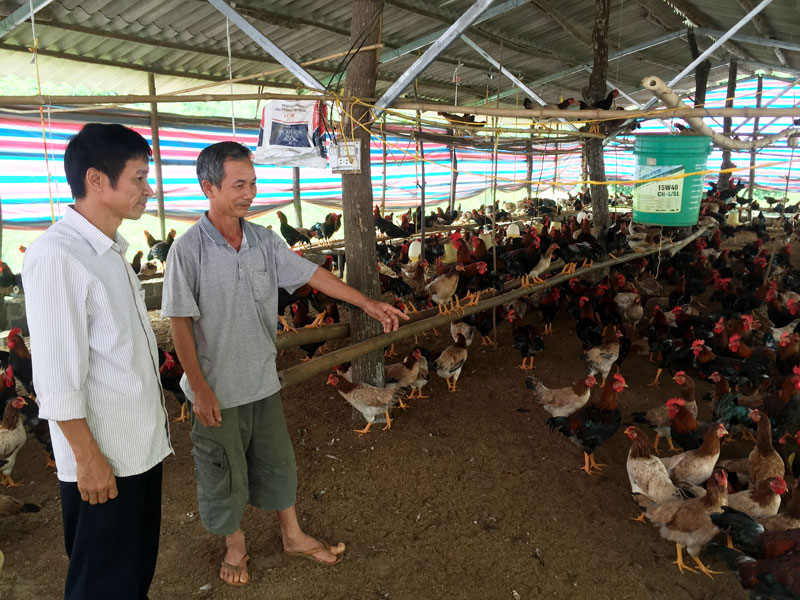
(HBO) - In recent 5 years, many households in Lac Thinh commune (Yen Thuy) have bravely got the loan capital to develop and expand the chicken raising model.
Making full use of local potentials and
advantages, according to the statistics, there are more than 30 households in
the whole commune developing the model of raising chickens with the total
number of over 40,000 chickens. In which, about 10 households have grown in
scale, ranging from 2,000-4,000 people per year, concentrating on the villages
of Dinh A, Nhon, Co, Pho Sau, Thinh Phu, etc. At present, the chicken raising
households choose to develop the varieties of chicken breeds, which has had
their own brand names, such as Lac Thuy chicken, Lac Son chicken, Hoa Phat
chicken (Dong Anh - Hanoi), etc. the time of raising from the start to output
products is from 75 to 180 days depending on varieties . Therefore, some
households with stable sources of capital and market can have the output of 3-4
litters per year.

The chicken raising model of Mr. Duong Van Ky
in Dinh A village, Lac Thinh commune (Yen Thuy)
We visited Mr. Duong Van Ky's family in Dinh
A village, one of the typical livestock raising households in the commune.
Previously, Mr. Ky family’s economy was mainly based on growing sugarcane, the
annual profit was only 30-40 million VND. Recognizing that some of the
households in the commune have developed efficient chicken raising models, Mr.
Ky used his savings to invent in piloting animal husbandry. In the first year,
Mr Ky was able to export to the market 2 litters with 4,000 chickens, each
weighing about 2 kg. With the price ranging from 80,000 to 85,000 VND / kg or
100,000 VND / kg at the peak, his family collected nearly 800 million VND.
Traders buying his products mainly came from Hanoi, Ninh Binh, etc.
The Vice Chairman of the People's Committee
of Lac Thinh commune added: "By effectively promoting the economic models,
especially the chicken raising model, according to the statistics in 2017, the
average income of the commune people reached at 32 million VND. In the coming
time, the commune will continue to encourage households to utilize the
potential and advantages of localities to develop effectively the chicken
raising model. They also expect the departments, boards and organizations to
support the variety, capital resources, technology, and cooperate with
companies to consume output products at a stable price, thus contributing to
improving people's income and improving the quality of living conditions.
According to data from the Hoa Binh Provincial Party Committee, the industrial production index for the first six months of 2025 is estimated to have increased by 20% compared to the same period last year. This marks the highest year-on-year growth rate for this period since 2020.
In the first six months of 2025, Hoa Binh province’s export turnover was estimated at 1.145 billion USD, marking an 18.11% increase compared to the same period in 2024. Import turnover was estimated at $ 804 million, a 17.15% increase, which helped the province maintain a positive trade balance.
The lives of the ethnic minority farmers in Tan Lac district have gradually improved thanks to the new directions in agricultural production. This is a testament to the collective strength fostered through the professional associations and groups implemented by various levels of the district’s Farmers’ Union.
With the motto the "product quality comes first,” after nearly one year of establishment and operation, Muong village’s Clean Food Agricultural and Commercial Cooperative, located in Cau Hamlet, Hung Son Commune (Kim Boi district), has launched reputable, high-quality agricultural products to the market that are well-received by consumers. The products such as Muong village’s pork sausage, salt-cured chicken, and salt-cured pork hocks have gradually carved out a place in the market and they are on the path to obtaining the OCOP certification.
In the past, the phrase "bumper harvest, rock-bottom prices" was a familiar refrain for Vietnamese farmers engaged in fragmented, small-scale agriculture. But today, a new spirit is emerging across rural areas of Hoa Binh province - one of collaboration, organisation, and collective economic models that provide a stable foundation for production.
Maintaining growing area codes and packing facility codes in accordance with regulations is a mandatory requirement for agricultural products to be eligible for export. Recently, the Department of Agriculture and Environment of Hoa Binh province has intensified technical supervision of designated farming areas and packing facilities to safeguard the "green passport" that enables its products to access international markets.



